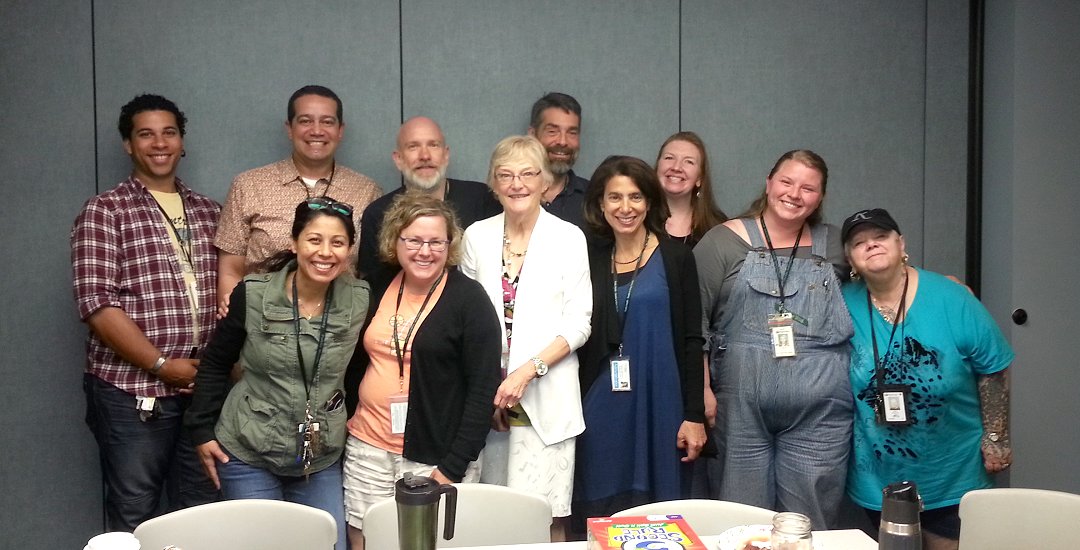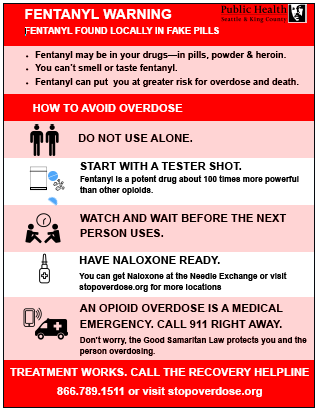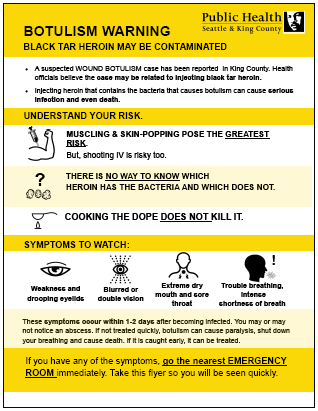King County Needle Exchange
Needle exchange is a public health program for people who use drugs by injection (PWID). It is an important component of a comprehensive set of programs designed to reduce the spread of HIV and other blood-borne infections among people who inject drugs, their families and communities. Nationally, about a quarter of all people living with AIDS acquired HIV infection directly or indirectly through injection drug use: either from sharing injection equipment, having unprotected sex with an injection drug user, or transmission to children born to injection drug users.
Needle exchange programs provide new, sterile syringes and clean injection equipment in exchange for used, contaminated syringes. They also get drug users into drug treatment and health care. Other services include testing for HIV, hepatitis, TB and other infections to which drug users are prone; treatment readiness counseling and case management services; education about harms associated with drug use and how to minimize them; and safe disposal of contaminated equipment.
Seattle's program began operating in 1989. Currently Public Health operates exchange programs in downtown Seattle, Capitol Hill and South Seattle/South King County. Community-based agencies provide exchange services in other parts of the county.
The King County Needle Exchange Team with Patty Hayes, Director of Public Health (center)
Sponsored by: Public Health's Health Care for the Homeless Network and Pioneer Square Medical Clinic.
There are likely 18,000-20,000 PWID living in King County. Needle exchange is the most effective strategy available to prevent HIV in members of this population who are not in drug treatment. It also protects non-injecting family members and sex partners. Without a vaccine or a cure, prevention is the only tool we have to control the spread of HIV. Public Health provides needle exchange for four reasons:
- Needle exchange reduces blood-borne diseases in our communities without increasing drug use. Several studies have shown compelling evidence that needle exchange programs decrease HIV and hepatitis transmission, but do not increase the use of injection drugs.1
- Preventing HIV infection in people who inject drugs also prevents HIV in women and newborn children. Many women are at risk for HIV because of their own injection drug use or because they are sexual partners of injection drug users. In the last ten years, there have been no cases of mother-to-child transmission among resident women in King County.
- By working with people who inject drugs, we can help get them into drug treatment.
- Finally, Public Health safely disposes of all contaminated syringes turned in to the exchange. This reduces the number of discarded syringes on our sidewalks and in our bus stops, yards, parks and play grounds. Our goal is to get used syringes out of circulation as quickly as possible. The longer a syringe remains in circulation, the more opportunities there are for that syringe to pass on a blood-borne disease.
1 Schackman, BR et al. (2006). The Lifetime Cost of Current Human Immunodeficiency Virus Care in the United States. Medical Care, 44,11:990-997.
YES. HIV infection among PWID has been shown to increase 6% per year on average in cities that do not have needle exchange. In contrast, HIV declined 6% per year among PWID in cities that have exchange programs.2 An Australian survey found that HIV prevalence declined 19% per year in cites with needle exchange compared to an 8% increase in cities that did not have exchange programs.3 In King County, the rate of HIV infection among PWID has remained low and stable for the past sixteen years, with only 3% of the local PWID population infected.
King County's program has also been successful in getting PWID off the streets and into drug treatment. In the last two years, Public Health needle exchange program placed 739 people in drug treatment.
2 Hurley, SF, Jolley, DJ, Kalidor, JM (1997). Effectiveness of needle-exchange programmes for prevention of HIV infection. The Lancet, 348:987-991.
3 Health Outcomes International (HOI), National Center for HIV Epidemiology and Clinical Research, Drummond, M (2002). Return on Investment in Needle and Syringe Programs in Australia. Canberra: Commonwealth Department of Health and Ageing.
King County spends $1.2 million/year on the needle exchange program. In contrast, life-time medical cost to treat one person who has HIV is estimated to be $385,200.4 By preventing infections in just three people per year, the needle exchange program pays for itself. By preventing HIV infections in just 1% of IDUs in King County, the program saves over $70 million in HIV-related medical costs. In this light needle exchange provides both a public health and an economic benefit to the residents of Seattle and King County.
4 Schackman, BR et al. (2006). The Lifetime Cost of Current Human Immunodeficiency Virus Care in the United States. Medical Care, 44,11:990-997.
The needle exchange is funded by disease prevention funds provided by Washington State, King County and the City of Seattle. Community-based agencies that provide needle exchange in King County may also receive private donations and grants from private foundations.
Fentanyl found locally in fake pills
Download a fact sheet to learn more.
See blog post:
Illicit Fentanyl found locally in fake opioid pills (10/3/17)
WARNING: Injecting heroin that contains Clostridium can cause serious infection and even death.
Learn more about Clostridium: English | Spanish
Needle Exchange schedule and locations
- For general information about needle exchange, call 206-263-2000
- This schedule is also available in PDF format (172 Kb)
Downtown Seattle
Robert Clewis Center
2124 4th Ave, Seattle, WA 98121
- Monday, Wednesday, Thursday, and Friday, 9 am to 5 pm
- Tuesday, 1 pm to 5 pm
- Saturday, 2 pm to 5 pm
Downtown Needle Exchange Medical Clinic:
Walk-ins welcome!
- Mondays, 1 pm to 4:30 pm
- Wednesday and Friday, 9 am to 4:30 pm
- HIV/STI/Hep Testing
- Hep C Treatment
- Abscess Treatment & Wound Care
- Antibiotics
- Care for Colds & Upper Respiratory Infections
- Connection to Primary Care
- Detox Coordination
- Resources & Referrals
- Narcan available
- HIV/STI/Hep Testing
Capitol Hill, Seattle
Robert Clewis Center 2
1161 11th Ave, Seattle, WA 98122
- Tuesday through Saturday, 6:30 pm to 8:30 pm
North Beacon Hill
Hepatitis Education Project
1621 S. Jackson St. Suite 201 Seattle, WA 98144
- Monday through Thursday, 12:30 pm to 5:30 pm
- Needle exchange and Hepatitis C testing
- Call for more information on services at 206-732-0311
North and East King County
People’s Harm Reduction Alliance (PHRA)
- Available on Monday, Tuesday and Friday
- For locations, call 530-454-5410
North King County
North County Outreach Referral and Exchange (NORE)
- Available on Tuesday through Friday
- To schedule a delivery, call 206-482-2468
South King County
South County Outreach Referral and Exchange (SCORE)
- To schedule a delivery, call 206-214-6040
U-District
People's Harm Reduction Alliance (PHRA)
4547 Brooklyn Ave NE, Seattle, WA 98105
- Tuesday and Thursday, 5 pm to 7 pm
- Friday and Sunday, 1 pm to 5 pm
Link/share our site at www.kingcounty.gov/needle

 Translate
Translate


